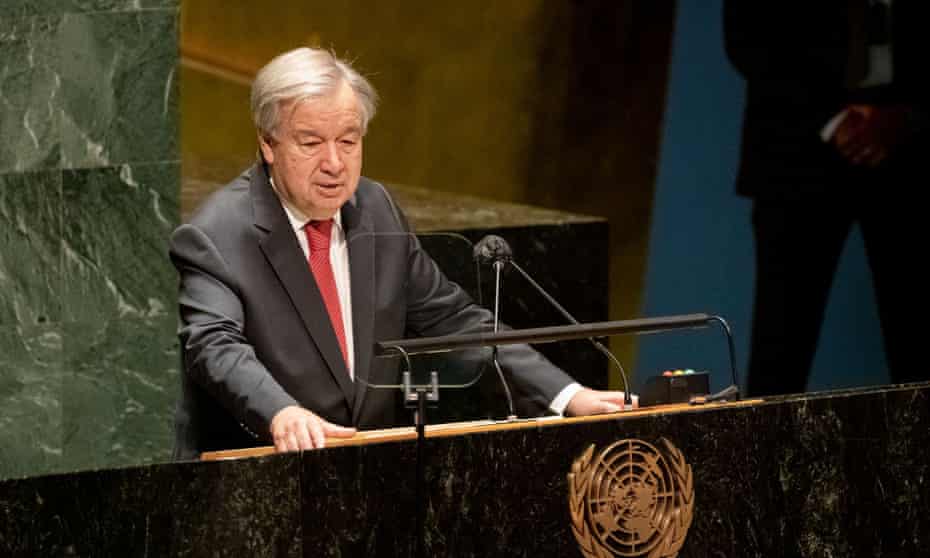UN chief urges airlines and shipping firms to do more to cut emissions
Antonio Guterres says current efforts are more consistent with global heating ‘way above 3C’

Airlines and shipping companies have failed to cut their greenhouse gas emissions, and must step up with fresh commitments on the climate crisis as Cop26 approaches, the UN secretary general has said.
Antonio Guterres said current efforts were inadequate and would lead to catastrophic global heating.
He told the Global Sustainable Transport conference on Thursday: “Let’s be honest. While [UN] member states have made some initial steps through the International Civil Aviation Organization and the International Maritime Organization to address emissions from shipping and aviation, current commitments are not aligned with the 1.5C goal of the Paris agreement. In fact, they are more consistent with warming way above 3C.”
World leaders and governments will meet in Glasgow from 31 October for the fortnight-long Cop26 summit on the climate crisis. Representatives from the aviation and shipping industries will attend, but international transport has largely escaped scrutiny at previous UN conferences because they were left out of the long-running talks nearly three decades ago.
Aviation and shipping each account for roughly 3% of global greenhouse gas emissions, and that share is growing. Both face major technological difficulties in decarbonising, as planes need high-density fuel and ships run on dirty forms of heavy oil.
Guterres is determined that the industries should not be allowed to duck out of global obligations to cut greenhouse gases. He called for more action as a matter of urgency, saying: “Adopting a new set of more ambitious and credible targets that are truly consistent with the goals of the Paris agreement must be an urgent priority for both these bodies [ICAO and IMO] in the months and years ahead.”
He called for zero-emission ships to be made commercially available by 2030, and to become the default choice for all companies in order to achieve zero emissions in the shipping sector by 2050. Airlines must start using sustainable aviation fuels now, he said, to cut carbon emissions per passenger by 65% by 2050.
Campaigners have long called for shipping and aviation emissions to be reduced. Faig Abbasov, the shipping director at the Transport and Environment thinktank, said: “Antonio Guterres is right. International action on shipping and aviation has been pitiful to date. We need to stop relying on the ineffective IMO and ICAO and demand that states take responsibility for all their emissions.
“This is what they signed up for in the Paris agreement. Regional bodies like the EU have shown that states have ample tools to address these emissions at the national level, like fuel mandates and carbon pricing. It’s time to use them.”
ICAO has come under fire for its target of a 2% annual fuel efficiency improvement, and a carbon offsetting scheme known as Corsia (carbon offsetting and reduction scheme for international aviation).
IMO agreed in 2018 to halve greenhouse gas emissions from shipping by 2050 compared with 2008 levels. The body, an arm of the UN, is working on strengthening its commitments by 2023 and may introduce interim measures including incentives to pursue alternative fuels and other innovative technologies.
An IMO spokesperson told the Guardian: “IMO adopted the first mandatory efficiency measures for international shipping in 2011 and has continued to work to address GHG [greenhouse gas] emissions while also seeking to ensure that no country is left behind on this journey. IMO’s regulations are not just verbal commitments. They are binding energy efficiency requirements, enforced globally on ships operating worldwide.”
She added: “International shipping is a vital sector, supporting world trade. There is no question that shipping needs to be sustainable and we must continue to work towards common goals and ensure together that the environment is stabilised by accelerating the decarbonisation of the maritime sector.”
Guy Platten, the secretary general of the International Chamber of Shipping, said: “The shipping industry is in full agreement that the IMO member states must push for more stringent emissions cuts across the sector. This is why we put forward a roadmap for how shipping can reach net zero carbon emissions by 2050, a doubling of the existing IMO target.”
An ICAO spokesperson said: “The targets [on emissions] represent what 193 self-interested sovereign countries collectively agreed to adopt on emissions reduction, and specifically relevant to their international legal commitments in air transport. ICAO is established and funded by those same governments to support that decision-making with expert advice, but the final decisions on standards, targets and policies arrived at here are always their collective diplomatic outcome.”
